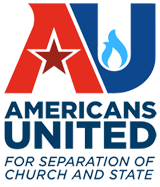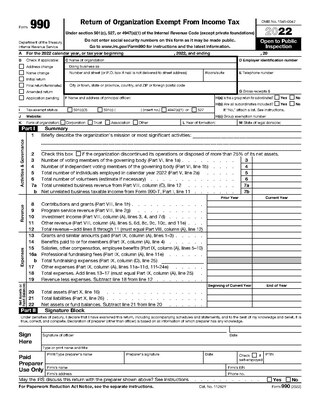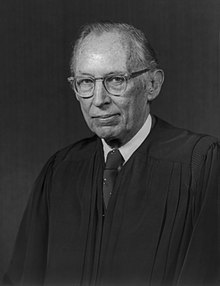Bob Jones University v. United States, 461 U.S. 574 (1983), was a decision by the United States Supreme Court holding that the religion clauses of the First Amendment did not prohibit the Internal Revenue Service from revoking the tax exempt status of a religious university whose practices are contrary to a compelling government public policy, such as eradicating racial discrimination.

Americans United for Separation of Church and State is a 501(c)(3) nonprofit organization that advocates for the disassociation of religion and religious organizations from government. The separation of church and state in the United States is sometimes interpreted to be provided in the Establishment Clause of the First Amendment to the United States Constitution, which states "Congress shall make no law respecting an establishment of religion..."
Allen v. Wright, 468 U.S. 737 (1984), was a United States Supreme Court case that determined that citizens do not have standing to sue a federal government agency based on the influence that the agency's determinations might have on third parties.
A 501(c) organization is a nonprofit organization in the federal law of the United States according to Internal Revenue Code and is one of over 29 types of nonprofit organizations exempt from some federal income taxes. Sections 503 through 505 set out the requirements for obtaining such exemptions. Many states refer to Section 501(c) for definitions of organizations exempt from state taxation as well. 501(c) organizations can receive unlimited contributions from individuals, corporations, and unions.
The Tax Anti-Injunction Act, currently codified at 26 U.S.C. § 7421, is a United States federal law originally enacted in 1867. The statute provides that with 14 specified exceptions, "no suit for the purpose of restraining the assessment or collection of any tax shall be maintained in any court by any person, whether or not such person is the person against whom such tax was assessed".
A 501(c)(3) organization is a United States corporation, trust, unincorporated association or other type of organization exempt from federal income tax under section 501(c)(3) of Title 26 of the United States Code. It is one of the 29 types of 501(c) nonprofit organizations in the US.
We the People Foundation for Constitutional Education, Inc. also known as We the People Foundation is a non-profit education and research organization in Queensbury, New York with the declared mission "to protect and defend individual Rights as guaranteed by the Constitutions of the United States." It was founded by Robert L. Schulz. At the U.S. Department of Justice, he is known as a "high-profile tax protester". The Southern Poverty Law Center asserts that Schulz is the head of the leading organization in the tax protester movement. The organization formally served a petition for redress of grievances regarding income tax upon the United States government in November 2002. In July 2004, it filed a lawsuit in an unsuccessful attempt to force the government to address the petition. The organization has also served petitions relating to other issues since then.

Form 990 is a United States Internal Revenue Service (IRS) form that provides the public with information about a nonprofit organization. It is also used by government agencies to prevent organizations from abusing their tax-exempt status. Some nonprofits, such as hospitals and other healthcare organizations, have more comprehensive reporting requirements.
Coit v. Green, 404 U.S. 997 (1971), was a case in which the United States Supreme Court affirmed a decision that a private school which practiced racial discrimination could not be eligible for a tax exemption.
Thornburgh v. American College of Obstetricians and Gynecologists, 476 U.S. 747 (1986), was a United States Supreme Court case involving a challenge to Pennsylvania's Abortion Control Act of 1982.
Regan v. Taxation with Representation of Washington, 461 U.S. 540 (1983), was a case in which the United States Supreme Court upheld lobbying restrictions imposed on tax-exempt non-profit corporations.
Nonpartisanism in the United States is organized under United States Internal Revenue Code that qualifies certain non-profit organizations for tax-exempt status because they refrain from engaging in certain political activities prohibited for them. The designation "nonpartisan" usually reflects a claim made by organizations about themselves, or by commentators, and not an official category per American law. Rather, certain types of nonprofit organizations are under varying requirements to refrain from election-related political activities, or may be taxed to the extent they engage in electoral politics, so the word affirms a legal requirement. In this context, "nonpartisan" means that the organization, by US tax law, is prohibited from supporting or opposing political candidates, parties, and in some cases other votes like propositions, directly or indirectly, but does not mean that the organization cannot take positions on political issues.
National Federation of Independent Business v. Sebelius, 567 U.S. 519 (2012), is a landmark United States Supreme Court decision in which the Court upheld Congress's power to enact most provisions of the Patient Protection and Affordable Care Act (ACA), commonly called Obamacare, and the Health Care and Education Reconciliation Act (HCERA), including a requirement for most Americans to pay a penalty for forgoing health insurance by 2014. The Acts represented a major set of changes to the American health care system that had been the subject of highly contentious debate, largely divided on political party lines.
Since the passage of the Affordable Care Act (ACA), there have been numerous actions in federal courts to challenge the constitutionality of the legislation. They include challenges by states against the ACA, reactions from legal experts with respect to its constitutionality, several federal court rulings on the ACA's constitutionality, the final ruling on the constitutionality of the legislation by the U.S. Supreme Court in National Federation of Independent Business v. Sebelius, and notable subsequent lawsuits challenging the ACA. The Supreme Court upheld ACA for a third time in a June 2021 decision.

In 2013, the United States Internal Revenue Service (IRS), under the Obama administration, revealed that it had selected political groups applying for tax-exempt status for intensive scrutiny based on their names or political themes. This led to wide condemnation of the agency and triggered several investigations, including a Federal Bureau of Investigation (FBI) criminal probe ordered by United States Attorney General Eric Holder. Conservatives claimed that they were specifically targeted by the IRS, but an exhaustive report released by the Treasury Department's Inspector General in 2017 found that from 2004 to 2013, the IRS used both conservative and liberal keywords to choose targets for further scrutiny.
King v. Burwell, 576 U.S. 473 (2015), was a 6–3 decision by the Supreme Court of the United States interpreting provisions of the Patient Protection and Affordable Care Act (ACA). The Court's decision upheld, as consistent with the statute, the outlay of premium tax credits to qualifying persons in all states, both those with exchanges established directly by a state, and those otherwise established by the Department of Health and Human Services.

Sissel v. United States Department of Health & Human Services was a lawsuit filed by the Pacific Legal Foundation as a constitutional challenge to the Patient Protection and Affordable Care Act (ACA). The plaintiffs claimed that the ACA's enactment violated the Origination Clause of the Constitution. The suit was dismissed by the U.S. District Court for the District of Columbia, and the dismissal was affirmed by the U.S. Court of Appeals for the District of Columbia Circuit. The plaintiffs sought review by the U.S. Supreme Court, which declined to hear an appeal.
A 501(h) election or Conable election is a procedure in United States tax law that allows a 501(c)(3) non-profit organization to participate in lobbying limited only by the financial expenditure on that lobbying, regardless of its overall extent. This allows organizations taking the 501(h) election to potentially perform a large amount of lobbying if it is done using volunteer labor or through inexpensive means. The 501(h) election is available to most types of 501(c)(3) organizations that are not churches or private foundations. It was introduced by Representative Barber Conable as part of the Tax Reform Act of 1976 and codified as 26 U.S.C. § 501(h), and the corresponding Internal Revenue Service (IRS) regulations were finalized in 1990.
Linchpins of Liberty v. United States (1:13-cv-00777) is a case decided in the United States Court of Appeals for the District of Columbia, in which the IRS agreed to a formal apology to all plaintiffs of the case. The IRS targeting groups based on a political viewpoint received widespread national attention.
Coffey v. State Educational Finance Commission (1969) was a federal case that addressed state support of segregation academies in Mississippi. More broadly, it established the standards the Internal Revenue Service would use to determine the tax-exempt status of private schools based on their segregation policies.






